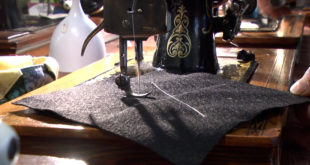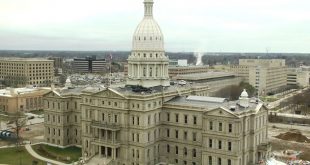Democrat and Republican representatives from several Midwest states have introduced a new bill aimed at overhauling ice breaking operations on the Great Lakes in the winter months. The goal is to make commercial shipping viable year-round, but that would require major changes to how the Coast Guard conducts itself.
Currently, cutters like the Mackinac patrol Whitefish Bay and the St. Mary’s River until the Soo Locks are closed for winter maintenance in January. Vessels then undergo their own repairs and begin ice breaking operations again around this time of year, starting in Lakes Huron and Michigan before clearing a path through Lake Superior.
Shipyards have adjusted to the schedule. Great Lakes freighters steam into Fincantieri Bay Shipbuilding in Sturgeon Bay, Wisconsin to dry dock and have work done between November and March. Ice fishing and other seasonal recreation activities could be affected, particularly in the southern parts of the Great Lakes system where freezes are less consistent.
If passed, the Great Lakes Winter Commerce Act will be able to transform the culture of the Coast Guard, but the bold venture also requires buy-in from several other organizations to change deeply ingrained patterns across the region.
The full press release from Congressman Jack Bergman is below.
——————————————
Today, Rep. Jack Bergman (R-MI) joined Rep. Mike Gallagher (R-WI) in introducing the bipartisan, bicameral Great Lakes Winter Commerce Act, a bill that would clearly define the U.S. Coast Guard’s (USCG) responsibility for icebreaking on the Great Lakes. Currently, the USCG conducts Great Lakes icebreaking based on a 95 year old Executive Order that fails to clearly define the USCG’s mission. This bill would update that mission to help ensure it meets the modern demands of commerce in the Great Lakes region.
Reps. Kaptur (D-OH), Gibbs (R-OH), Dingell (D-MI), McClain (R-MI), Gwen Moore (D-WI), Huizenga (R-MI) and Joyce (R-OH) joined the Members in introducing this legislation.
Rep. Bergman said, “U.S. Coast Guard icebreaking on our Great Lakes ensures the flow of commerce and connects our communities. Having consistently advocated for increased icebreaking activities in Congress, I’m proud to support the bipartisan Great Lakes Winter Commerce Act so that Michigan’s First Congressional District can continue to benefit from ship activity on the lakes throughout the winter.”
“In cold winter months, icebreaking helps keep our Great Lakes economy moving. But a lack of sufficient icebreaking in recent years has shown that Congress needs to modernize the Coast Guard’s icebreaking mission on the Great Lakes,” said Rep Gallagher. “The Great Lakes Winter Commerce Act is a bipartisan, bicameral bill codifying an icebreaking performance standard to meet the reasonable demands of commerce. This will help ensure that small businesses in Northeast Wisconsin can continue shipping goods from point A to point B — no matter the month or the weather.”
“This winter, towns along the St. Clair River are experiencing widespread flooding due to thick ice forming on the river. It’s apparent now more than ever that we need an additional heavy icebreaker in the Great Lakes region to meet the demands of the winter months and prevent flooding,”said Rep. McClain. “Since coming to Congress, I’ve worked with the Coast Guard on coordinating additional Ice Cutters to the region. I’m proud to take the next step in getting Michigan’s 10th District the help it needs, by cosponsoring the Great Lakes Winter Commerce Act, which will ensure we get this much needed ice cutter in our region.”
“As the Representative of a district that relies heavily on Great Lakes shipping and taconite, I know that delays in icebreaking on Lake Superior can take a serious toll on our economy. That’s why I am pleased to cosponsor legislation that will empower the U.S. Coast Guard to keep our region’s ports and harbors open, and subsequently, help spur our critical economic drivers,” said Rep. Stauber.
“Because the Great Lakes power our region’s economy, we cannot allow thick ice to freeze our commerce and growth. With this bipartisan bill, we can ensure our shipping routes are open and accessible to the businesses who rely on them,” said Rep. Dingell.
“The Great Lakes aren’t just an invaluable natural resource, they’re also an economic powerhouse,” said Congressman Dave Joyce, Co-Chair of the House Great Lakes Task Force. “By codifying the U.S. Coast Guard’s icebreaking mission, our bipartisan legislation will help prevent shipping delays, revenue loss, and lost wages. I look forward to working with our colleagues on both sides of the aisle to get this bill signed into law so that we can preserve the Great Lakes economy and the more than 1.5 million jobs it supports.”
Insufficient icebreaking can lead to cargo ships being stuck in port for days at a time in winter months, with the Lakes Carrier Association estimating that this alone cost Great Lakes businesses lost nearly $1 billion in revenue in the 2018-2019 winter season.
The Great Lakes Winter Commerce Act would fix this problem by:
- Codifying the USCG’s Great Lakes icebreaking mission into law with new performance standards.
- Requiring the USCG to report to Congress on the operational costs based on meeting these new performance standards.
- Requiring the USCG to report annually to Congress on their icebreaking activities on the Great Lakes.
- Requiring the USCG to coordinate icebreaking operations with commercial vessel operators.
- Defining ambiguous terms from the USCG’s Great Lakes icebreaking mission including “open to navigation” and “reasonable demands of commerce.”
- Authorizing the appropriations of a new Great Lakes icebreaker at least as capable as the current Mackinaw-class icebreaker.
 Keweenaw Report Your Source for Local News and Sports
Keweenaw Report Your Source for Local News and Sports





